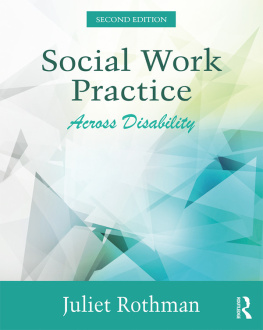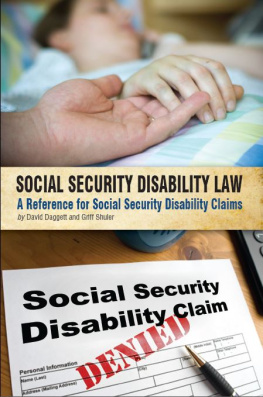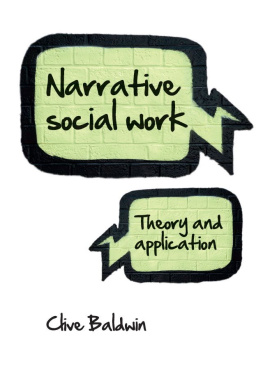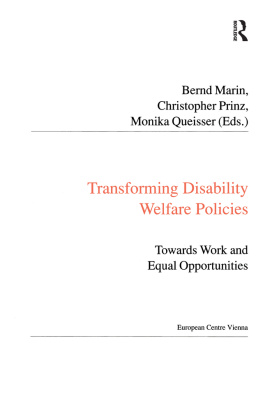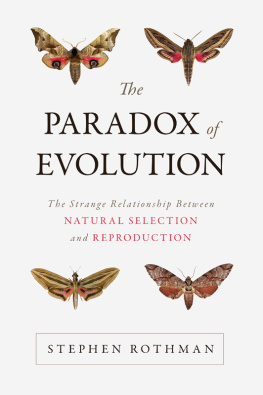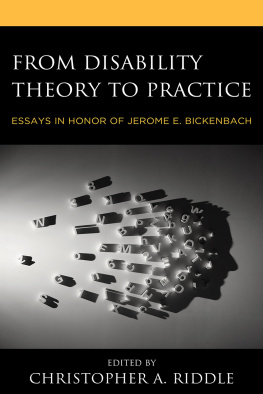p.i
Social Work Practice Across Disability
This book will help prepare the reader to work across disabilities by providing knowledge and training grounded within the ecological framework in four principal areas. The four principal areas the reader will be trained in are: the societal environment and disability; disability and the individual experience; essential skills for social work micro, mezzo, and macro practice with people with disabilities; and the resource and support network for persons with disabilities. The book is organized around four units, each of which addresses one of the areas noted. It is not the purpose of this book to enable the reader to gain expertise in any one disabling condition or impairment. Rather, the goal is to provide a broad base of knowledge and skills, which will enable the reader to work effectively across a variety of disabling conditions.
Juliet Rothman , MSW, PhD, received her MSW from Hunter College (City University of New York) and her PhD (in philosophy) from American University in Washington, DC. She taught at the National Catholic School of Social Service (CUA) in Washington, DC. At the University of California Berkeley, she has taught social work practice, diversity-competent social work practice, social work with people with disabilities, death and bereavement, aging, and law and ethics in gerontology in the School of Social Welfare, aging, health and diversity in the School of Public Health, and interdisciplinary teams in the UCB/UCSF Medical School program. Her professional publications include: From the Front Lines: Student Cases in Social Work Ethics, The Self-Awareness Workbook for Social Workers, Contracting in Clinical Social Work, Stepping Out into the Field: A Field Work Manual for Social Work Student , and Cultural Competence in Process and Practice: Building Bridges .
p.iv
Second edition published 2018
by Routledge
711 Third Avenue, New York, NY 10017
and by Routledge
2 Park Square, Milton Park, Abingdon, Oxon, OX14 4RN
Routledge is an imprint of the Taylor & Francis Group, an informa business
2018 Taylor & Francis
The right of Juliet Rothman to be identified as author of this work has been asserted by her in accordance with sections 77 and 78 of the Copyright, Designs and Patents Act 1988.
All rights reserved. No part of this book may be reprinted or reproduced or utilized in any form or by any electronic, mechanical, or other means, now known or hereafter invented, including photocopying and recording, or in any information storage or retrieval system, without permission in writing from the publishers.
Trademark notice : Product or corporate names may be trademarks or registered trademarks, and are used only for identification and explanation without intent to infringe.
First edition published by Pearson 2002
Library of Congress Cataloging-in-Publication Data
Names: Rothman, Juliet Cassuto, 1942- author.
Title: Social work practice across disability / Juliet Rothman.
Description: Second edition. | New York, NY : Routledge, 2018. | Includes bibliographical references and index.
Identifiers: LCCN 2017045294 (print) | LCCN 2017052216 (ebook) | ISBN 9781315178028 (ebook) | ISBN 9781138037182 (hardback : alk. paper) | ISBN 9781138037199 (pbk. : alk. paper)
Subjects: LCSH: Social work with people with disabilities.
Classification: LCC HV1552 (ebook) | LCC HV1552 .R68 2018 (print) | DDC 362.4/04532dc23
LC record available at https://lccn.loc.gov/2017045294
ISBN: 978-1-138-03718-2 (hbk)
ISBN: 978-1-138-03719-9 (pbk)
ISBN: 978-1-315-17802-8 (ebk)
Typeset in Warnock Pro
by Swales & Willis Ltd, Exeter, Devon, UK
p.xii
It is the goal of this book to assist social workers and social work students to practice in a caring, sensitive, and effective manner across disability. As we begin, it is important to consider some of the common assumptions our society makes about people with disabilities because, as members of that society, we ourselves can carry some or all of these assumptions within ourselves as well. Their effect is profound, regardless of whether we consider ourselves as persons with disabilities.
By placing the assumptions here, at the very beginning of our work together, it is hoped that they will be present in your thinking as you consciously and carefully work to dismantle them and consider the field of disability in all of its richness as a wonderful opportunity for growth, for both you and your clients.
These assumptions are defined by Michelle Fine and Adrienne Asch in their article Disability Beyond Stigma: Social Interaction, Discrimination, and Activism (2000):
First assumption: It is often assumed that disability is located solely in biology, and thus disability is accepted uncritically as an independent variable (Fine & Asch, 2000, p.202).
p.xiii
This assumption locates the disability within the body of the person: The person is both the cause and the effect of the condition. Early theories about disability were grounded in this assumption, as we shall see, and these still influence societal and personal beliefs about disability. More modern theories have begun to consider the impact of the societal milieu on the location of disability.
Second assumption: When a disabled person faces problems, it is assumed that the impairment causes them (Fine & Asch, 2000, p.203).
This assumption is critical for each of us to examine as we provide services across disability. People come to us for assistance with problems, and there are an infinite variety of possible problems and causes of problems. Assuming that when someone with a disability walks into your office, the disability is at the center and is the principal causative force in his or her problem both denies your clients reality and diminishes him or her as a person. Of course, it can also lead to inappropriate planning and interventions.
Third assumption: It is assumed that the disabled person is a victim (Fine & Asch, 2000, p.204).
Victimhood is associated both with helplessness and self-blame, neither of which is necessarily a part of the life experience of clients with disabilities. Victimhood diminishes the person; rather, a disability can be both a challenge and an opportunity for growth.
Fourth assumption: It is assumed that disability is central to the disabled persons self-concept, self-definition, social comparison, and reference groups (Fine & Asch, 2000, p.205).
The centrality of the disability to the person varies enormously and is affected by many factors, such as life experiences, character and personality, the age at which the person has become disabled, type of impairment, and the social milieu within which the person functions at home, at work, and at play.
Fifth assumption: It is assumed that having a disability is synonymous with needing help and social support (Fine & Asch, 2000, p.205).
While disability historically has been viewed as associated with helplessness and dependence, and disabled people were often kept apart from others in a state of social isolation, this is not the current experience of people with disabilities in our society. Thus, this assumption discounts the ability of the person to adapt, develop alternative ways of meeting needs, and use societal resources to maximize independence at every level. All human beings share this amazing capacity to adapt and to develop a positive and meaningful lifestyle. This should not be taken to mean that people with disabilities are never in need of help. Help may be neededbut it is important that the individual determine the kind of assistance and the circumstances in which it may be needed.


